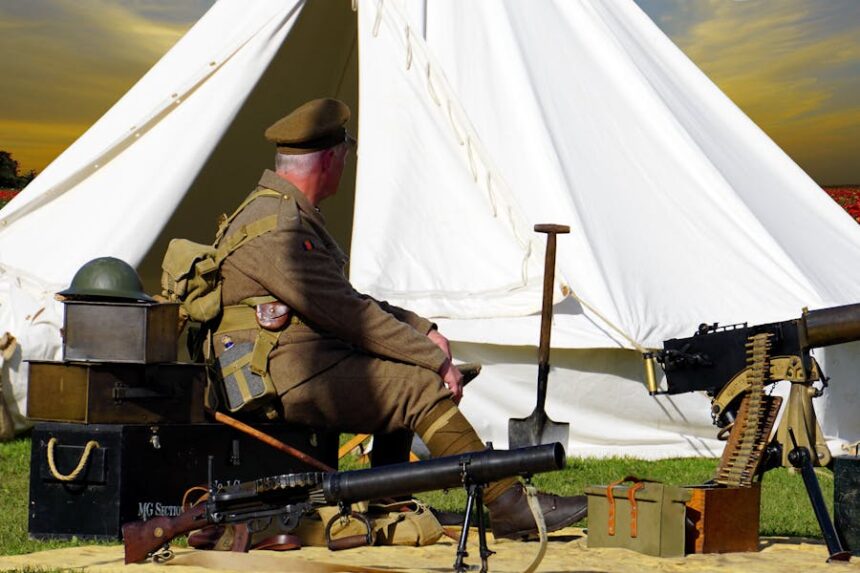The question, “Are Gulf War veterans considered combat veterans?” holds significant weight for those who served, their families, and policymakers. Understanding this classification isn’t just a matter of semantics—it directly impacts eligibility for critical Veterans Affairs (VA) benefits, healthcare, and recognition. Gulf War veterans served in one of the most strategically complex operations of the modern era, and the classification of their service as “combat-related” determines everything from medical coverage to disability compensation.
In recent years, increased awareness of Gulf War Syndrome and other exposure-related conditions has reignited public interest in whether those who served during Operations Desert Shield and Desert Storm meet the federal definition of combat veterans. VA guidelines, military discharge documents, service location, and unit roles all factor into the determination.
This article explores the definitions, legal considerations, and real-world implications of the question: Are Gulf War veterans considered combat veterans? With comprehensive insights structured into easy-to-read outlines, you will leave this article with a thorough understanding of the criteria, policies, and lived experiences that define the answer.
Are Gulf War Veterans Considered Combat Veterans?
Yes, many Gulf War veterans are considered combat veterans, but not all. The classification depends on whether the veteran served in a combat zone as defined by the Department of Defense and received combat-related awards or pay. The VA uses specific criteria to determine eligibility for combat veteran benefits.
The VA Definition of Combat Veteran
The VA does not classify all military service as “combat.” Rather, it uses specific legal and administrative criteria to define what counts. For Gulf War veterans, service in a designated combat zone during active conflict plays a key role in qualifying as a combat veteran.
A combat veteran must have served in a location and time officially recognized by the Department of Defense as a combat zone. For Gulf War veterans, that includes service during Operations Desert Storm and Desert Shield from August 1990 onward. Service in countries such as Iraq, Kuwait, and Saudi Arabia during this time is typically considered.
Furthermore, combat-related decorations such as the Combat Infantryman Badge (CIB), Combat Action Ribbon (CAR), or receipt of Hostile Fire Pay or Imminent Danger Pay provide further evidence of combat service. Gulf War veterans who can verify such documentation are usually eligible for combat veteran status.
The classification affects VA benefits in a number of ways. For example, combat veterans receive enhanced eligibility for health care for five years after discharge, priority group assignments, and can more easily access mental health services.
However, confusion often arises when veterans served in support roles or were stationed in combat zones without engaging in direct conflict. The VA considers such cases individually, and proper documentation—such as deployment orders and DD-214 forms—is essential for classification.
This nuanced system means that while many Gulf War veterans are rightly acknowledged as combat veterans, a subset may not meet all the criteria without further substantiation.
How Does the VA Determine If Gulf War Service Qualifies as Combat?
How the VA determines Gulf War combat service is key to accessing vital health benefits. Here’s what veterans need to know.
What Are the Official Combat Zones?
The Department of Defense identifies combat zones such as Kuwait, Iraq, Saudi Arabia, Bahrain, Qatar, UAE, and the Red Sea during the Gulf War period.
What Documentation Does the VA Require?
To verify combat service, veterans should present:
- DD-214 with campaign medals listed
- Proof of receipt of Hostile Fire or Imminent Danger Pay
- Orders showing deployment to a combat zone
What Are the Common Misconceptions?
Some believe that any Gulf War-era service equals combat service, which is incorrect. Location and role matter.
Is There a VA Combat Veteran Identifier?
Yes. The VA may assign a Combat Veteran Identifier to eligible veterans based on documentation.
How Does It Affect Health Benefits?
Combat veteran status grants five years of free VA health care for any condition related to active service.
Requirements for Being Classified as a Gulf War Combat Veteran
To be officially classified as a Gulf War combat veteran, several specific criteria must be met. The VA relies on a combination of deployment records, combat-specific indicators, and official military documentation to determine eligibility. These requirements help ensure that only those who served in designated combat roles receive the appropriate recognition and benefits.
- Service in a Combat Zone
Veterans must have been deployed to areas recognized by the Department of Defense as official combat zones during the Gulf War. These include Iraq, Kuwait, Saudi Arabia, Bahrain, Qatar, the Red Sea, and others. - Receipt of Combat Pay
Military pay records must indicate receipt of Hostile Fire Pay or Imminent Danger Pay, which is typically granted to those serving in hazardous environments. - Combat-Related Awards
Earning specific honors such as the Combat Infantryman Badge, Combat Action Ribbon, or similar distinctions supports a combat veteran classification. - Evidence on DD-214
The DD-214 discharge form should list campaign medals or document deployment to combat zones. - Direct Combat Involvement
Veterans must have served in roles that involved active engagement with hostile forces, as opposed to support or administrative duties. - VA Evaluation and Confirmation
The VA uses the submitted records to evaluate and confirm combat veteran status, which can unlock health care benefits and related services.
Why the Designation Matters for Gulf War Veterans
The label “combat veteran” is more than symbolic. It can change a veteran’s life. Veterans classified under this designation receive special consideration for VA benefits that can dramatically affect their access to care, compensation, and even job opportunities.
Gulf War veterans often suffer from chronic conditions linked to toxic exposures, known collectively as Gulf War Syndrome. Combat designation helps streamline eligibility for treatment. Without this recognition, veterans may have to go through more rigorous processes to prove their entitlement.
The psychological weight of combat service is also acknowledged more openly through this status. Combat veterans receive specialized mental health services, including PTSD treatment, without copays in most cases.
Moreover, many federal, state, and nonprofit programs prioritize combat veterans for housing assistance, employment services, and even student loan benefits. It is a status that unlocks a fuller range of post-service support.
Given the complexity of military roles during the Gulf War, some veterans must advocate assertively for this recognition. Assistance from a Veterans Service Officer (VSO) can be pivotal in helping eligible veterans compile the necessary documents and evidence.
Combat Veteran Status in the Context of Gulf War Service
Clarifying whether Gulf War veterans are considered combat veterans requires an understanding of legal definitions, evolving policies, and deployment specifics.
What Makes the Gulf War Unique
The Gulf War, while short in duration, was marked by the groundbreaking use of advanced military technology, precision airstrikes, and swift coalition victories. Massive troop deployments and rapid operations created new precedents in modern warfare, influencing how combat roles were perceived and recorded.
Evolution of Combat Veteran Recognition
Over time, the recognition of combat veterans has expanded to reflect the complexities of modern military engagements. This includes not only traditional ground combat roles but also personnel involved in cyber warfare, aerial missions, and support tasks within combat zones.
Legal References to the Gulf War
Laws such as 38 U.S. Code §101(33) explicitly reference the Persian Gulf War, establishing eligibility frameworks for benefits and healthcare. VA guidelines further detail how service during this period may qualify as combat-related.
Support Roles and Eligibility
Personnel in logistics, medical, and intelligence roles may also qualify if deployed to a combat zone and exposed to similar risks or received Hostile Fire or Imminent Danger Pay.
Inconsistent Classification Practices
Combat status designation can vary case by case, heavily reliant on thorough documentation and individual VA assessments, leading to inconsistencies in recognition.
Conclusion
The question “Are Gulf War veterans considered combat veterans?” requires a deep dive into policy, history, and personal military service. While many Gulf War veterans meet the requirements and receive the benefits of combat veteran status, others may find themselves in a gray area needing evidence and advocacy.
The classification matters. From accessing critical healthcare to receiving proper recognition for service-related trauma, the designation plays a direct role in a veteran’s post-service life. As laws and interpretations continue to evolve, staying informed is vital.
Veterans should not assume or guess their status. They should proactively review their records, seek assistance from accredited VSOs, and pursue proper classification to unlock the benefits they rightfully deserve.
FAQ’s
What benefits do Gulf War combat veterans receive?
They are eligible for five years of free VA healthcare post-discharge, mental health support, and priority processing for VA disability claims and related services.
Can support personnel be considered combat veterans?
Yes, support personnel may qualify if they were deployed in-theater, faced combat-related risks, and received Hostile Fire Pay or Imminent Danger Pay.
How can I prove I am a Gulf War combat veteran?
You should submit your DD-214, deployment orders, evidence of combat awards, and military pay records. A Veterans Service Officer (VSO) can assist with your claim.
Is there an appeal process if the VA denies combat veteran status?
Absolutely. Veterans can file an appeal within the VA system and may seek assistance from legal aid, advocacy organizations, or a VSO.
Does combat veteran status affect GI Bill eligibility?
No, GI Bill eligibility is based on active service duration, not combat designation. However, combat status does impact healthcare access and priority group placement.




